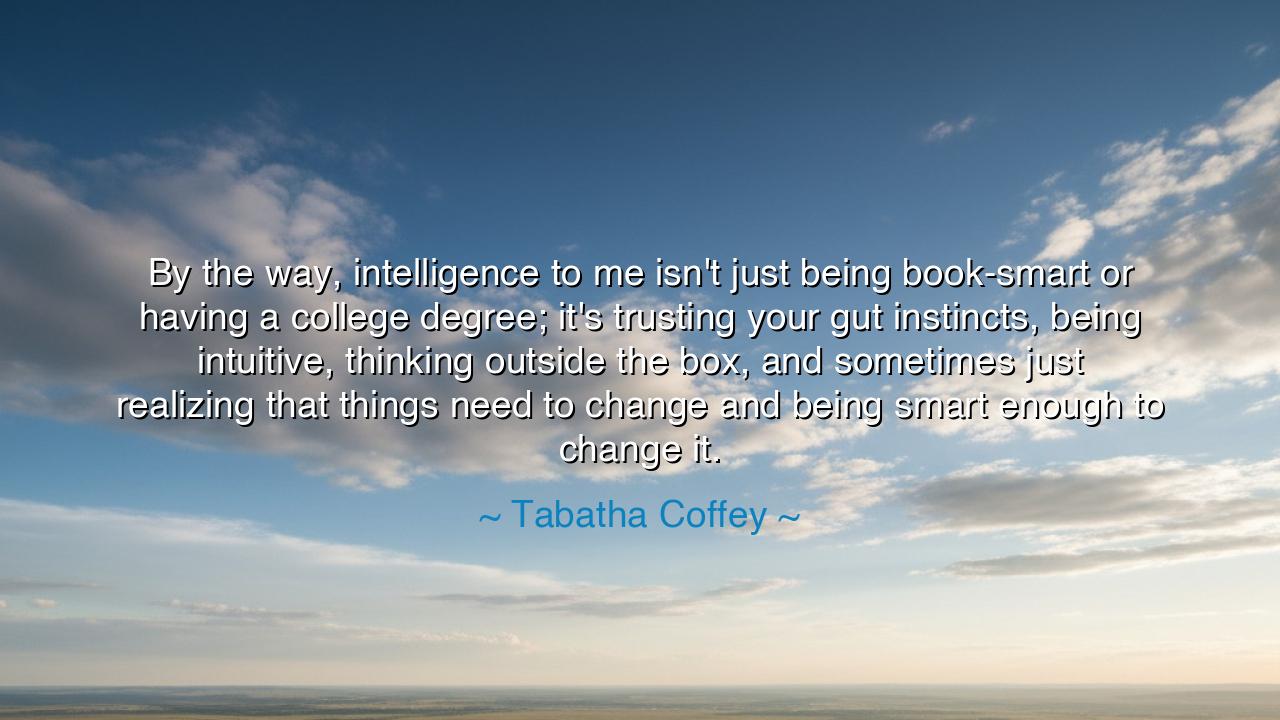
By the way, intelligence to me isn't just being book-smart or
By the way, intelligence to me isn't just being book-smart or having a college degree; it's trusting your gut instincts, being intuitive, thinking outside the box, and sometimes just realizing that things need to change and being smart enough to change it.






The wise and fearless Tabatha Coffey, known for her candor and her mastery of transformation, once declared: “By the way, intelligence to me isn't just being book-smart or having a college degree; it's trusting your gut instincts, being intuitive, thinking outside the box, and sometimes just realizing that things need to change and being smart enough to change it.” In this statement lies a truth as old as civilization itself — that intelligence is not confined to the parchment of diplomas or the walls of universities, but dwells in the living rhythm of experience, perception, and courage. Coffey’s words are a hymn to practical wisdom, to that quiet flame of insight that has guided humanity long before the birth of books or schools. She reminds us that true intelligence is not memorization, but adaptation; not compliance, but awareness.
When Coffey speaks of “trusting your gut instincts,” she invokes one of the oldest and most profound forms of knowing — the intuitive mind, that mysterious faculty that whispers truth before the intellect has words for it. The ancients called this the voice of the soul. Warriors relied on it in battle, healers in their craft, and travelers in unknown lands. It is the deep current beneath the surface of logic — a knowing born not of calculation, but of connection. The modern world, obsessed with credentials and analysis, has forgotten this wisdom. Yet the greatest decisions of life — whom to trust, when to act, when to walk away — often depend on the instinctive intelligence of the heart. To ignore it is to walk blind in daylight.
Coffey’s understanding of intelligence as “thinking outside the box” speaks to the courage of the creative mind, that divine spark which dares to question what others accept. Every age has been shaped by those who refused to think in straight lines — from Leonardo da Vinci, who imagined machines of flight centuries before their invention, to Marie Curie, who challenged the boundaries of science and paid for her discoveries with her own health. These visionaries were not confined by the “box” of their time, for they understood that true intelligence is not imitation, but invention. The book-smart may recite what has been written, but the wise create what has never been dreamed.
When Coffey says, “Sometimes just realizing that things need to change and being smart enough to change it,” she touches upon the essence of self-awareness, the rarest and most transformative kind of wisdom. For intelligence without humility is stagnant; it sees the world but cannot see itself. The ability to recognize that something — a habit, a belief, a situation — no longer serves you, and to have the strength to alter it, is one of the highest forms of understanding. It is the intelligence of growth, the wisdom of those who evolve rather than decay. As the river carves its path by moving, so too does the soul remain alive by changing.
History offers us shining examples of this truth. Consider Charles Darwin, who began his journey believing in the stability of species, only to find through patient observation that life itself is change. Rather than cling to the safety of his earlier beliefs, he adapted, allowing truth to reshape him. This was not merely scientific intelligence — it was spiritual courage. Or think of Eleanor Roosevelt, who transformed personal insecurity into compassion and leadership. She, too, listened to her inner wisdom, recognizing that her circumstances could only define her if she allowed them to. These souls, like Coffey herself, remind us that the measure of intelligence is not what one knows, but how one responds to life.
Coffey’s words also carry a subtle challenge — a rebellion against the narrow view of intelligence as something awarded, tested, or graded. In her view, the true intellect is not a fortress of facts, but a living fire of awareness. The farmer who reads the language of the sky, the artist who captures emotion in color, the mother who senses danger before it arrives — all are bearers of wisdom no degree can confer. This is the ancient intelligence that predates the written word, the same intelligence that guided our ancestors through wilderness and war. It is the intelligence of intuition, creativity, and change — the qualities that make us human in the fullest sense.
So let this be the lesson for all who seek wisdom: do not measure your intelligence by the approval of others, nor confine it to books and tests. Cultivate your intuition — that quiet voice that knows without proof. Train your mind to question, your heart to feel, and your spirit to adapt. When life shifts, do not cling to what was, but be “smart enough to change it.” For the wise do not resist transformation; they dance with it.
In the end, as Tabatha Coffey teaches, intelligence is not what you store in your mind, but what you awaken in your being. It is the union of logic and intuition, knowledge and courage. It is the ability to see clearly, to act bravely, and to evolve gracefully. Therefore, seek not merely to be educated — seek to be aware, creative, and alive. For that is the intelligence that built civilizations, healed hearts, and shaped the destiny of humankind.






AAdministratorAdministrator
Welcome, honored guests. Please leave a comment, we will respond soon